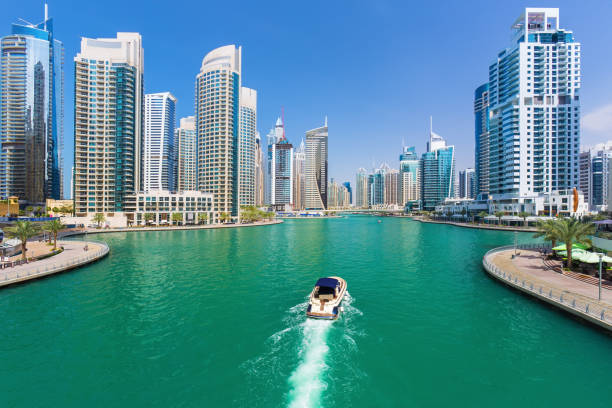Acquiring a residence visa in Dubai is a crucial step for individuals who wish to live and work in this extraordinary city. This process involves a comprehensive series of actions that require careful planning and adherence to legal requirements. Understanding the various types of visas available, knowing the eligibility criteria, and preparing necessary documentation are key components to successfully obtaining a Dubai residence visa .
Understanding the Importance of a Residence Visa

What is a Residence Visa?
A residence visa is a legal document that grants an individual the right to reside in a country for an extended period. In the context of Dubai, it allows expatriates to live, work, and, in many cases, sponsor their family members for residency. This visa type is essential for anyone looking to establish a long-term presence in the UAE, as it not only secures one’s right to live in Dubai but also opens doors to various opportunities, including employment and investment. Without a residence visa, lawful residency in Dubai is not permissible, making it a fundamental requirement for all non-nationals.
Types of Residence Visas in Dubai
Dubai offers several categories of residence visas that cater to different needs and circumstances. The primary types include:
- Employment Visa: Issued to foreigners who are employed by a company in Dubai.
- Investor Visa: For individuals who invest a minimum amount in a business or real estate.
- Family Visa: Allows UAE residents to sponsor their family members to live in Dubai.
- Retirement Visa: For retirees who meet specific financial and age criteria.
- Property Owner Visa: For individuals who own property in Dubai.
Each of these visa types comes with its own set of requirements, benefits, and renewal terms, which must be thoroughly understood before proceeding with the application process.
Eligibility Criteria for Residency

General Requirements for All Applicants
To be eligible for a residence visa in Dubai, applicants must meet several general requirements. Firstly, the individual must possess a valid passport with at least six months’ validity remaining. In addition, applicants should typically have a clean criminal record and must undergo a medical examination. This health test is crucial as it screens for communicable diseases, which are strictly regulated in the UAE. Furthermore, adequate health insurance coverage is typically required to ensure compliance with UAE laws.
Additionally, all applicants must provide evidence of financial stability to cover living expenses while residing in Dubai. This often includes proof of income or sufficient savings. Depending on the category of the visa, there may be other specific criteria that need to be fulfilled. For instance, those applying for a family visa would require proof of relationship and financial capability to sponsor family members.
Additional Requirements for Specific Visa Types
Beyond the general eligibility requirements, specific visa types come with additional requirements that applicants must meet. For an employment visa, one must submit a job offer letter or contract from a Dubai-based employer. The employer is also responsible for obtaining an employment approval from the Ministry of Human Resources and Emiratisation.
In the case of an investor visa, applicants are required to show proof of investment in a UAE-based business or property, typically a minimum amount specified by the authorities. For a retirement visa, potential candidates must meet financial thresholds, such as minimum monthly income or savings in a bank. Each visa category demands unique documentation and verification, emphasizing the importance of understanding the specific criteria tied to one’s visa type.
Document Preparation for Visa Application

Essential Documents Required
Document preparation is a pivotal step in acquiring a Dubai residence visa, as the submission of required paperwork is essential for approval. The necessary documents often include:
| Document | Description |
|---|---|
| Passport Copy | Must be valid for at least six months with blank pages. |
| Passport-sized Photographs | Recent photos with a white background as per UAE specifications. |
| Medical Test Results | Proof of health status following a mandatory medical examination. |
| Employment or Sponsorship Letter | Document from an employer or sponsor verifying the relationship or role. |
| Financial Proof | Evidence of sufficient funds (bank statements or pay slips). |
Having all required documents organized and properly submitted is essential for avoiding delays and complications. It is also crucial to ensure all documentation is verified and meets the established norms specified by the UAE authorities.
Tips for Document Verification
Document verification is a critical step that should not be overlooked. One tip for applicants is to double-check that all documentation is complete and within the specified formats required by the UAE government. This includes ensuring that personal information matches across all documents to avoid any discrepancies. Additionally, applicants should seek to have their documents translated into Arabic if they are in any other language, as the submission of translated copies may be necessary.
Keeping a checklist can significantly help in tracking what needs to be prepared and verified. Create a list based on the requirements for the specific visa type you are applying for and systematically ensure every point is checked off. It’s also beneficial to consult professionals or use visa services if there’s doubt or lack of familiarity with the procedures and requirements for document verification.
The Application Process
Applying Online vs. In-Person
The application process for a Dubai residence visa can predominantly be conducted online through the official government portals, which offers a more convenient option for many applicants. The online system is user-friendly and allows applicants to submit documents, track application status, and make payments seamlessly. This method is typically quicker, as it reduces the need for in-person visits to government offices.
Alternatively, applicants may opt to apply in-person at approved typing centers or government offices. This can be advantageous for those who prefer face-to-face assistance or have questions regarding their applications. The in-person method also provides a direct way to ensure that all documents are appropriately submitted. However, this route may involve waiting times and additional travel. Understanding both options ensures that applicants can choose the best route for their specific circumstances and comfort levels.
The Role of Emirati Sponsors in the Application
A significant aspect of many residence visa applications is the role of Emirati sponsors, particularly for family and professional visas. An Emirati sponsor provides the legal backing required by the UAE government for residency applications. Usually, this involves a family member who is a UAE national or an employer who is a UAE-based entity. This sponsorship is a critical component as it verifies the applicant’s intention to reside in the country and affirms they will be supported and integrated into UAE society.
The responsibilities of the sponsor also extend beyond the application process. They may need to assist with renewals, provide financial support during the applicant’s residency, and ensure the legal compliance of the sponsored individual. Thus, sourcing a trusted and qualified Emirati sponsor is crucial for a successful residency visa application.
Timeline and Fees Involved
Typical Processing Time for Residence Visas
The time frame for processing a UAE residence visa can vary widely depending on multiple factors, including the type of visa requested and the thoroughness of the documentation submitted. Typically, the timeline can range from 2 to 4 weeks for most visas. However, some applications might experience delays due to incomplete documentation or additional processing checks. Understanding the nuances of these timelines can help applicants manage their expectations and plan accordingly.
It is advisable to initiate the visa application process well in advance before any planned trip or move to ensure adequate time for any unforeseen complications. Monitoring the application status online and promptly addressing any requests for information can also facilitate a smoother and faster processing time.
Breakdown of Associated Costs
There are various fees associated with acquiring a residence visa in Dubai, which can include application fees, medical testing fees, and visa issuance fees. The total cost can vary significantly based on the type of visa and the sponsor’s status. For example, obtaining an employment visa typically includes expenses for the Employer’s sponsorship and medical insurance. Understanding the fee structure can help applicants budget better and avoid unexpected financial strains during the process.
Here is a general breakdown of the potential costs involved:
- Application Fees: Costs vary depending on the visa type, usually ranging from AED 2,000 to AED 4,000.
- Medical Examination Fees: Costs can be around AED 500 to AED 1,500.
- Insurance Premiums: Valid insurance coverage can take anywhere from AED 500 to AED 2,000, based on the coverage required.
- Renewal Fees: Typically half the cost of the initial visa processing fees at the time of visa expiration.
On average, total initial costs can range from AED 3,000 to AED 10,000, depending on the specifics of the application. It is important to prepare for these financial obligations in advance to avoid surprises during the application process. Furthermore, renewing the visa is also subject to additional fees, so it’s essential to consider the long-term costs associated with residency.
Concluision
Acquiring a residence visa in Dubai is an essential step for anyone looking to make this vibrant city their home. The process, while expert-defined, requires careful attention to detail and adherence to the legal framework. By understanding the eligibility criteria, preparing the requisite documents, and following the application steps diligently, new residents can navigate through the bureaucracy smoothly. Furthermore, being aware of the associated costs and timelines will ensure a seamless transition for those relocating to this dynamic metropolis. By leveraging professional resources and guidance if necessary, you can effectively ease your way through obtaining your residency visa and enjoy all that Dubai has to offer.
Frequantly Asked Questions
1. How long does the residence visa process take?
The residence visa processing time typically ranges from 2 to 4 weeks, depending on the type of visa and the completeness of your application.
2. Can I apply for a residence visa without a job?
Yes, there are several types of residence visas in Dubai, such as those for investors, retirees, or property owners, which do not require employment.
3. What is the validity of a Dubai residence visa?
A Dubai residence visa is generally valid for 2 or 3 years, depending upon the category for which it was issued; it can be renewed before expiration.
4. What should I do if my visa application is rejected?
If your application is rejected, ensure you understand the reasons stated in the rejection letter, rectify any issues, and consider reapplying or seeking professional advice.
5. Is it mandatory to have an Emirati sponsor?
Not all types of residence visas require an Emirati sponsor; however, many employment and family visas do, so it’s essential to check the specific requirements for your visa type.
